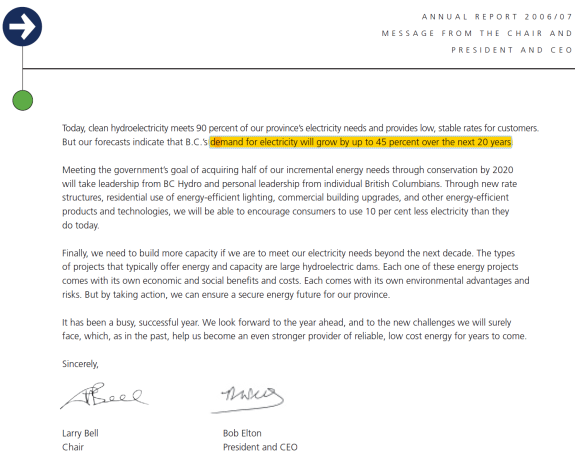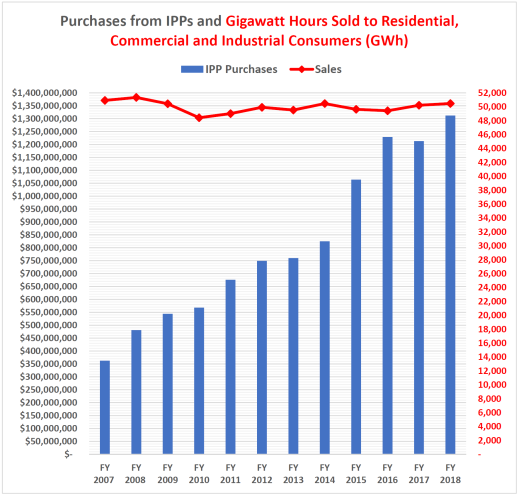Before BC Hydro installed smart meters, manager of revenue assurance John Millard said the utility was losing 850 gigawatt hours of electricity to theft, mostly by illegal cannabis growers.
Vancouver Sun’s Nick Eagland reported in 2016 that a BC Hydro spokesperson credited smart meters and Millard’s team with reducing power theft by 80%. That would be a saving of 680 gigawatt hours.
Smart meter installations were substantially complete by 2015, a year that BC Hydro sold 49,272 GWh to residential, commercial and industrial customers. In 2011, when the meter changeovers commenced, sales to those customers were 49,735 GWh.
So, not only did demand for power by paying customers in BC decrease, BC Hydro’s need for power was eased by theft reductions. Together, that means about 1,150 GWh less electricity was needed in 2015, compared to 2011.
Yet, BC Hydro bought more than 4,000 extra GWh from independent power producers (IPPs) in that latter year, while its property plant and equipment account grew from $10 billion to $21 billion. ($25 billion in 2018.) IPP purchases increased $511 million between 2011 and 2015. All, without an increase in demand.
What’s wrong with this picture? The same mismanagement that has plagued BC Hydro’s demand forecasting for almost two decades.
Page 7 of the Annual Report for FY 2007 includes this:

Eleven year on, sales to residential and business consumers dropped from 50,908 GWh to 50,464. (Note: I do not include “other sales” because these include deliveries to customers outside BC.) That reduction of 1% is a far cry from the 25% increase predicted by BC Hydro in the period.
These unrestrained actions of BC Hydro are not inconsequential . They damage both residents and businesses directly and, considering that commercial operations generally pass costs on to consumers, it is individual citizens that carry the burden.
BC Hydro and the energy ministry employ many people paid salaries of hundreds of thousands of dollars each year. But, these people don’t work to save ratepayers’ money but to convince customers that the 80% rate increase between 2007 and and 2018 was appropriate and the huge increases still to come are necessary.
We’re paying one load of operatives to remove money from our pockets and another load to convince us that all is well and we as the victims should be happy.
Monday, I watched a CTV news report that featured a citizen complaining about 25¢ being added to his monthly electricity bill for the Customer Crisis Fund. The consumer would really be angry if he stopped to think about the real losses he and others suffer through malfeasance and mismanagement.
He objects to ratepayer contributions to social services but doesn’t object to paying for corporate welfare?
This graphic representation is taken from BC Hydro reports:

BC Hydro just released its annual service plan report for the year ended March 31. According to British Columbia’s Budget Transparency and Accountability Act, the utility’s quarterly report to June 30 should be available to the public by September 15.
A year ago, the first quarter report was posted to the Internet a month after the deadline but the energy ministry claimed BC Hydro had complied with the law, even though an electronic version was not available until a month after the legislated deadline. I made repeated but unsuccessful requests for the report between September 15 and October 15.
Anticipating a delay this year, I’ve asked the energy ministry to make the report available by September 15 or provide a copy of the minister’s written statement giving reasons for the non-compliance. This notice from the minister is required under Section 17 of the BTA act.
Categories: BC Hydro, Independent Power Producers (IPP)




Looking at the McCandless paper I note that the 2017/18 service plan reports transmission and distribution line losses of 5,454GWh. That’s a mere $1.5 mil of energy losses every single day (at $0.10/kWh). They should encourage distributed generation and Net Metering and localize the economic benefits instead of enriching the multi-nationals.
LikeLike
Rafe asked a good question. The problem we face is that the NDP now answers the phone…
http://commonsensecanadian.ca/bc-hydro-real-debt-grown-1337-liberals-shouldnt-someone-call-cops/
LikeLike
Question-Math in BC (-1+3=2) 100m dollars columbia power at 3 cents ,about ,sold and buy same indirect or direct for 300 m ipp power,at about 9 cents, leaves 200 million loss every 12 months for BC taxpayer.?
LikeLike
12,000 legacy meters at $32.40/month equals over $4 million per year income. Thanks BCUC, BCHYDRO, thugs, bullies and thieves.
LikeLike
Another excellent article. Thank you! I heartily encourage everyone to share a link to all their contacts.
Please remember not everyone is on a social media so use e/mail as well to reach as many as possible.
Bonus: it will introduce them to this quality blog if they are unaware of it now.
LikeLike
Great article Norm. Just possibly BC folks will finally understand that by someone’s design they are being made an internationally uncompetitive work force . Of the four component ingredients that go into an economy the one that always takes the hit is labor incomes.
With BC Hydro deliberately over committing to new generation and passing the higher costs to the population, they are leaving everyone with a lower standard of living while selling to “others” at only the marginal cost of production.
How long will it take for BC citizens to understand they have been deliberately tagged to provide others with electricity at below real full costs?
LikeLike
Fiduciary duty, a vacuum within the NDP too? Getting Meggs to go along with dialing back paid mouthpieces is a non-starter, look at what happened to the CoV’s communications/spin doctors under Vision.
LikeLike
I believe the reason the problem continues to fester and the politicians of all stripes continue to escape accountability is encapsulated in this paragraph:
“Monday, I watched a CTV news report that featured a citizen complaining about 25¢ being added to his monthly electricity bill for the Customer Crisis Fund. The consumer would really be angry if he stopped to think about the real losses he and others suffer through malfeasance and mismanagement.”
The crisis fund is a line item on his bill, so the citizen is aware of it and objects. He doesn’t stop to think about the real losses because he doesn’t know what he doesn’t know. But common sense tells us that if he knew he would be apoplectic, given his reaction to the 25-cent insult.
The reason he doesn’t know (apart from his apparent lack of self-research) is that CTV and other traditional news organizations upon which most citizens still rely on to be informed doesn’t itself display the investigative depth to do any more than look at line items on a hydro bill.
Just think of the general outrage if samples of Norm’s work were appended to everyone’s BC Hydro bill each month. Major news organizations have the platform to do the equivalent of that, but lack the will or the wit for some reason.
That’s a pity.
LikeLike
Great work yet again Norm. As Hydro purchases more from its IPPs they also have made upgrades to legacy facilities to increase production. All of which leads to surplus production, that will have to be sold at a loss. The pattern has to be reduced in order to lessen the burden on ratepayers. If, indeed Site C goes to completion there will be even more surplus, and it looks more and more like the utility will be bankrupt. It is already experiencing negative cash flows as per Moody’s reports.
LikeLike
Hey how about the promoted transit project that has no train cars included.Like being sold a car.. oh but the engine isnt included in the price!
LikeLike
It seems that B.C. Hydro is being run by a professional gang of con-artists and John Horgan is allowing this tradition. Adrian Dix was proven correct now that B.C. Hydro has been found guilty of covering up cost-overruns in the Hydro IT Department. The cover up includes that fact that they split the technology division into two parts so that the project would not be reviewed by by the Utilities Commission. The unnecessary costs have exceeded $35 million.
Now, if we apply the BC Hydro accounting fabrication and Government’s lack of due diligence (incompetence) regarding the Site C Dam, we will discover that the $12 Billion + Dam is not needed. What ever happened to the Energy Conservation Plan?
There was a time when the World believed that we were about to be invaded by ALIENS. The Space invaders usually stated, “Take me to your leader.”
If the flying saucer crew visit BC, we would have to admit we “have no Leaders, only followers.”
Note of Caution: BC Hydro will be spending our money to promote and re-elect yesterday’s YES Men.
LikeLike
B.C. Hydro ought to reduce the size of the P.R. department. They provide no useful service to the citizens of B.C. they only provide a service to the B.C. lieberals who are no longer in office. Its time to clean up that mess. why the NDP hasn’t done that is beyond me and if Meggs is supposed to be “assisting” the premier, all he is assisting him in doing is helping B.C. Hydro screw us the consumer.
I’m just fine with paying more for education and medical services and I’d sure wouldn’t object to more housing for the drug addicted along with free drugs at the injection sites, but this mess at B.C Hydro is more than I can stomach. That Site C is so not required. its a waste of our tax dollars and that continual purchasing of electricity from IPPs, is wasteful. better to cancel the contracts and just tell them if they don’t like its, see you in court. I’m sure a good investigator would find enough paper work to demonstrate those signed contract with el gordo were less than sterling business propositions and more like financial rewards to the political donors.
Thank you for you work on this topic. Now if some one could just get our MLAs to read this blog and apply the knowledge.
LikeLike